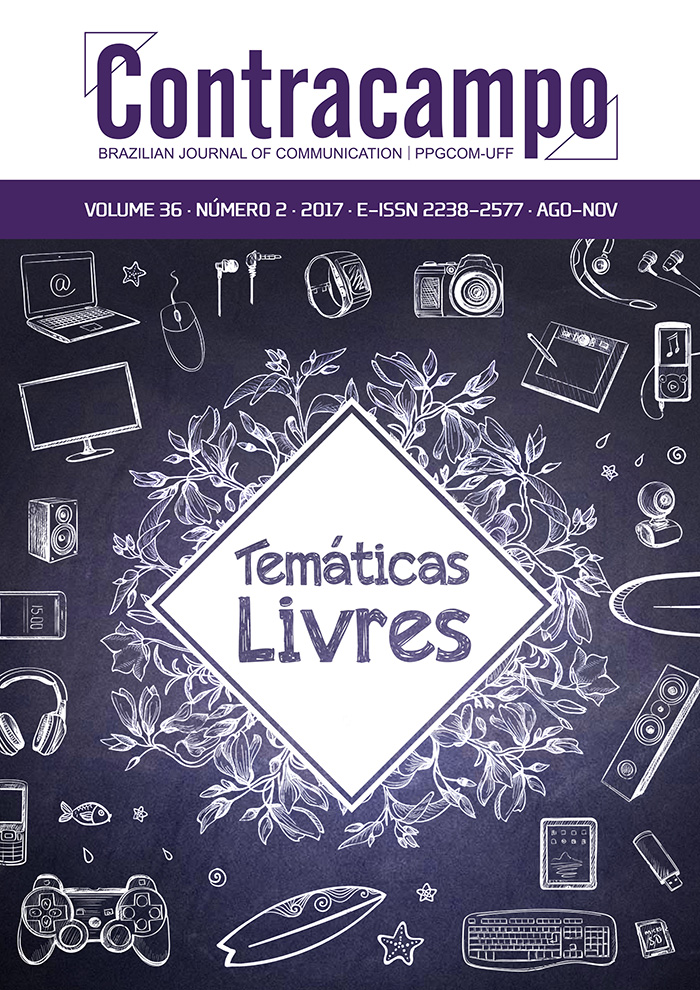Paying to win: culture, agency and virtual goods in video games
DOI:
https://doi.org/10.22409/contracampo.v36i2.1032Keywords:
Games, Consumo, Bens Virtuais, Hearthstone.Abstract
This article focuses its argument on an understanding of the consumption process in contemporary culture through the notion of pastiche by Fredric Jameson. The aim is to question how the dynamics of industrial production of symbolic goods were responsible for creating products whose purpose do not relate to the idea of presenting an identity, but follows a strategy of creation of replicas of an entire pre-established symbolic context. That said, we sought to discuss how societal networks in the videogame Hearthstone are the result of this necessarily contemporary cultural condition that gives rise to design principles that not only enable in-game action but that ensue complex virtual goods acquisition and trade processes.Downloads
References
AARSETH, Espen. Cybertext: Perspectives on Ergodic Literature. Baltimore: The John Hopkins University Press, 1997.
FALCÃO, Thiago. Não Humanos em Jogo. Agência e Prescrição em World of Warcraft. Tese de Doutorado. Universidade Federal da Bahia, 2014.
BOGOST, Ian. Persuasive Games: The Expressive Power of Video Games. Cambridge, MA : MIT Press, 2007.
CAILLOIS, Roger. Man, Play and Games. Urbana: University of Illinois Press, 2001.
HJARVARD, Stig. The Mediatization of Culture and Society. Londres: Routledge, 2013.
JAMESON, Fredric. Postmodernism, or, The Cultural Logic of Late Capitalism. Londres: Verso, 1991.
JAMESON, Fredric. The Cultural Turn. Selected Writings on the Postmodern 1983-1998. Londres: Verso, 1998.
JANSSON, André. The Mediatization of Consumption: Towards an Analytical Framework of Image Culture. In: Journal of Consumer Culture, n. 2, v. 5, 2002.
JENKINS, Henry. Convergence Culture. Where Old and New Media Collide. New York: New York University Press, 2006.
KAVENEY, Roz. From Alien to the Matrix. Reading Science Fiction Film. London: I.B. Tauris, 2005.
KLASTRUP, Lisbeth. A Poetics of Virtual Worlds. Tese de Doutorado. IT University of Copenhagen, 2003.
KRZYWINSKA, Tanya. World Creation and Lore: World of Warcraft as Rich Text. In: H. G. Corneliussen e J. W. Rettberg. (Eds.) Digital Culture, Play, and Identity. A World of Warcraft Reader. Cambridge: The MIT Press, 2009.
LATOUR, Bruno. Reassembling the Social. An Introduction to Actor-Network Theory. Oxford: Oxford University Press, 2005.
LEHDONVIRTA, Vili.; ERNKVIST, Mirko. Converting the Virtual Economy into Development Potential: Knowledge Map of the Virtual Economy. Washington, DC: infoDev / World Bank, 2011.
LEMOS, André. Cibercultura. Tecnologia e Vida Social na Cultura Contemporânea. Porto Alegre: Sulina, 2002.
LUNENFELD, Peter (Ed.). The Digital Dialectic. New Essays on New Media. Cambridge: The MIT Press, 2000.
MANOVICH, Lev. Software Takes Command. New York: Bloomsbury Publishing. 2013.
MURRAY, Janet H. Hamlet no holodeck: o futuro da narrativa no ciberespaço. São Paulo: Itaú Cultura: Unesp, 2003.
SOARES, Letícia Perani. “O maior brinquedo do mundo”: a influência comunicacional dos games na história da interação humano-computador. Tese de Doutorado. Universidade Federal do Rio de Janeiro, 2016.
TAYLOR, T. L. Raising the Stakes. E-Sports and the Profissionalization of Computer Gaming. Cambridge: The MIT Press, 2012.
Downloads
Published
Issue
Section
License
The authors retain copyright and grant the journal the right to publish their work for the first time under the Creative Commons licence, which allows the exchange of academic work and recognition of authorship in the journal.


